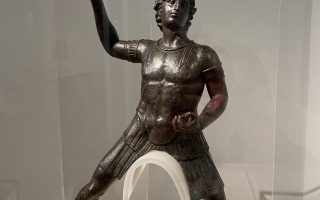One of the most prolific historians of the Hellenistic Age was without a doubt Polybius of Megalopolis. His Histories not only provide us with a plethora of information on ‘Rome’s rise to power’, but the wider political reality of the Hellenistic World of the third and second centuries BC. Our series on the ‘great’ Hellenistic figures is off to a great start!
ἐπεὶ δ᾽ οὐ τινὲς οὐδ᾽ ἐπὶ ποσόν, ἀλλὰ πάντες ὡς ἔπος εἰπεῖν ἀρχῇ καὶ τέλει κέχρηνται τούτῳ, φάσκοντες ἀληθινωτάτην μὲν εἶναι παιδείαν καὶ γυμνασίαν πρὸς τὰς πολιτικὰς πράξεις τὴν ἐκ τῆς ἱστορίας μάθησιν.
But all historians, one may say without exception, and in no half-hearted manner, but making this the beginning and end of their labour, have impressed on us that the soundest education and training for political actions is the study of History.
LIFE
Born around 200 BC, Polybius was part of an aristocratic Megalopolitan family. His father Lykortas had a prominent career in the Achaean Koinon, a federal state which united a large number of poleis on the Greek mainland. Not much is known about Polybius’ youth, but he appears to have developed a keen interest in politics as he fought as part of the cavalry in the battle against Messene in 183 BC at the age of 17. Coincidentally, this was also the battle in which the famous Achaean statesman Philopoemen died. As his father was a good friend of the general, Polybius was chosen to carry his ashes back to their native city (Plut. Phil. 21.).
By the time Polybius was in his thirties, his political star had continued to rise: among other things he accompanied his father on a foreign diplomatic mission to Alexandria. By the time he was thirty in 170 BC, Polybius had been elected commander of the cavalry for the tenth time. However, the Third Macedonian War (171-168 BC) brought the renewed tensions between Macedonian Kingdom and Rome to the Greek states. The Roman victory not only established the end of the Macedonian kingdom but it also had a profound impact on internal Achaean affairs: a thousand of the most influential Achaean leaders, including Polybius, were shipped off to Rome. This because of Roman concerns that the Achaeans had not justly supported their cause. The man responsible, according to Polybius at least, was Kallikrates of Leontium as he had used this opportunity to carve out a position of power for himself (Pol. His. 30. 29.).
Doomed to spend the next 17 years in exile in Rome, Polybius became acquainted with Scipio Aemilianus, the son of the Roman general Aemilius Paulus who had defeated the Macedonian king Perseus at the Battle of Pydna in 168 BC. When Scipio’s military career took him abroad on expeditions to Spain and Africa, Polybius would accompany his good friend. Even after the Achaeans were allowed to return home in 150 BC, he continued to accompany Scipio on his foreign expeditions: he was there for example, when the city of Carthage was destroyed in 146 BC. At the same time the Achaen Koinon was embroiled in a war with Rome. Polybius only returned after the destruction of Corinth to help rebuild the Achaean state and Greece as a whole. He remained in Achaea until his death around 118 BC.
WORK
During his exile in Rome, Polybius had direct access to the inner workings of the Roman state. Due to his interest in politics and history, which were undoubtedly Polybius decided to write a history to discover how the Romans came to conquer a big part of the known world in only 53 years (229-168 BC), eventually expanding his work until 146 BC. Polybius’ Histories are an invaluable source for anyone working on Roman history of the second century BC, as well as the wider Hellenistic World as he pays considerable attention to other parts of the Hellenistic World throughout his narrative, providing us with information not found in other authors. Aside from the Histories, Polybius also wrote a biography for his great hero Philipoemen and a military treatise Tactics, which has not survived.




